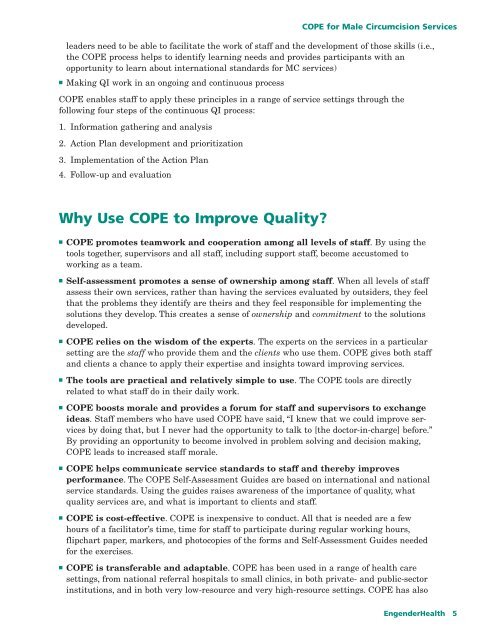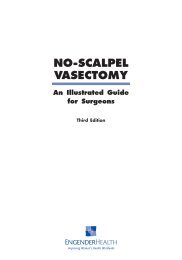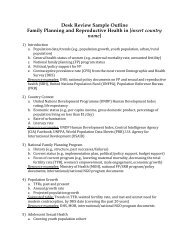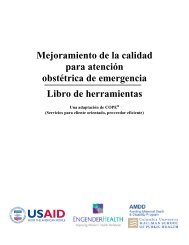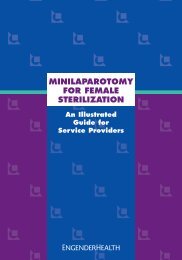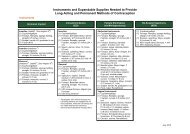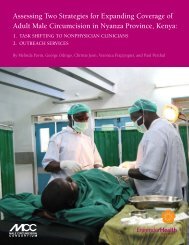COPE® FOR MALE CIRCUMCISION SERVICES - EngenderHealth
COPE® FOR MALE CIRCUMCISION SERVICES - EngenderHealth
COPE® FOR MALE CIRCUMCISION SERVICES - EngenderHealth
Create successful ePaper yourself
Turn your PDF publications into a flip-book with our unique Google optimized e-Paper software.
COPE for Male Circumcision Services<br />
leaders need to be able to facilitate the work of staff and the development of those skills (i.e.,<br />
the COPE process helps to identify learning needs and provides participants with an<br />
opportunity to learn about international standards for MC services)<br />
■ Making QI work in an ongoing and continuous process<br />
COPE enables staff to apply these principles in a range of service settings through the<br />
following four steps of the continuous QI process:<br />
1. Information gathering and analysis<br />
2. Action Plan development and prioritization<br />
3. Implementation of the Action Plan<br />
4. Follow-up and evaluation<br />
Why Use COPE to Improve Quality<br />
■ COPE promotes teamwork and cooperation among all levels of staff. By using the<br />
tools together, supervisors and all staff, including support staff, become accustomed to<br />
working as a team.<br />
■ Self-assessment promotes a sense of ownership among staff. When all levels of staff<br />
assess their own services, rather than having the services evaluated by outsiders, they feel<br />
that the problems they identify are theirs and they feel responsible for implementing the<br />
solutions they develop. This creates a sense of ownership and commitment to the solutions<br />
developed.<br />
■ COPE relies on the wisdom of the experts. The experts on the services in a particular<br />
setting are the staff who provide them and the clients who use them. COPE gives both staff<br />
and clients a chance to apply their expertise and insights toward improving services.<br />
■ The tools are practical and relatively simple to use. The COPE tools are directly<br />
related to what staff do in their daily work.<br />
■ COPE boosts morale and provides a forum for staff and supervisors to exchange<br />
ideas. Staff members who have used COPE have said, “I knew that we could improve services<br />
by doing that, but I never had the opportunity to talk to [the doctor-in-charge] before.”<br />
By providing an opportunity to become involved in problem solving and decision making,<br />
COPE leads to increased staff morale.<br />
■ COPE helps communicate service standards to staff and thereby improves<br />
performance. The COPE Self-Assessment Guides are based on international and national<br />
service standards. Using the guides raises awareness of the importance of quality, what<br />
quality services are, and what is important to clients and staff.<br />
■ COPE is cost-effective. COPE is inexpensive to conduct. All that is needed are a few<br />
hours of a facilitator’s time, time for staff to participate during regular working hours,<br />
flipchart paper, markers, and photocopies of the forms and Self-Assessment Guides needed<br />
for the exercises.<br />
■ COPE is transferable and adaptable. COPE has been used in a range of health care<br />
settings, from national referral hospitals to small clinics, in both private- and public-sector<br />
institutions, and in both very low-resource and very high-resource settings. COPE has also<br />
<strong>EngenderHealth</strong> 5


